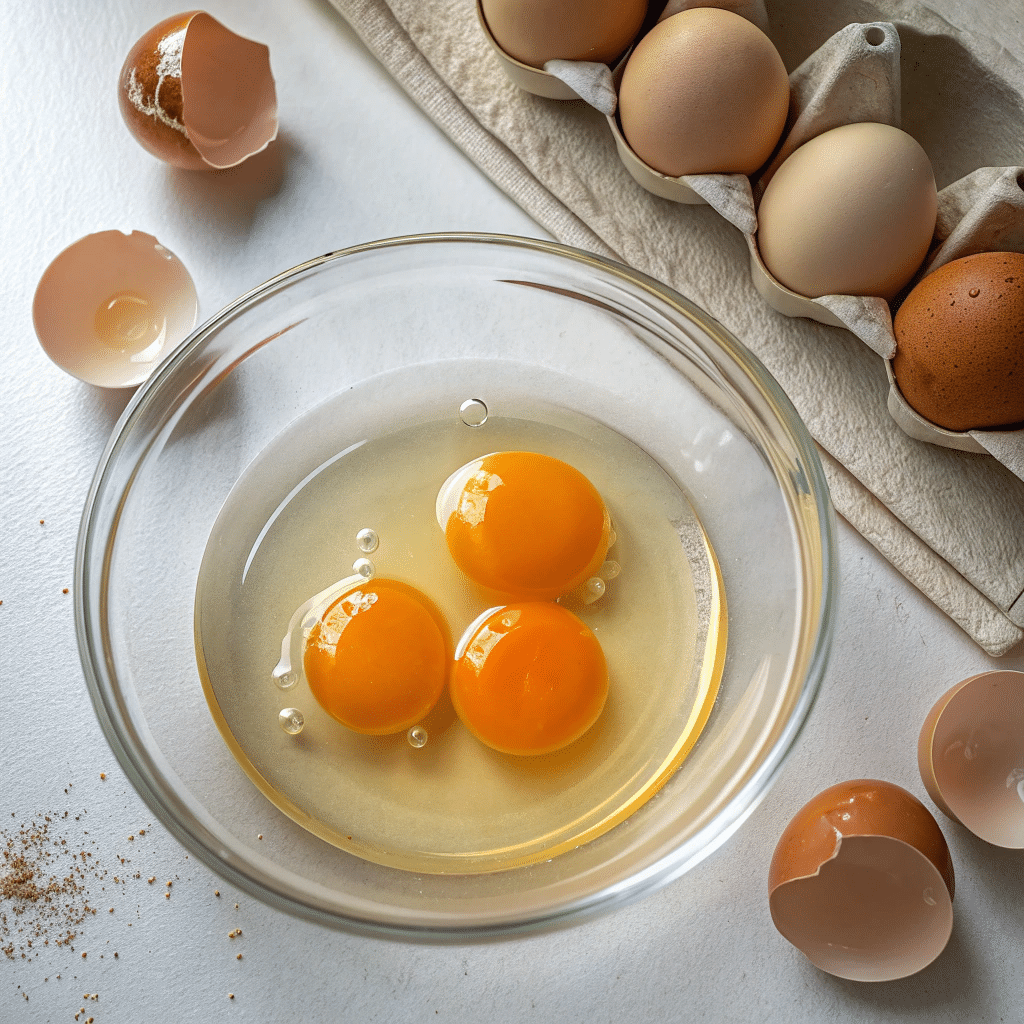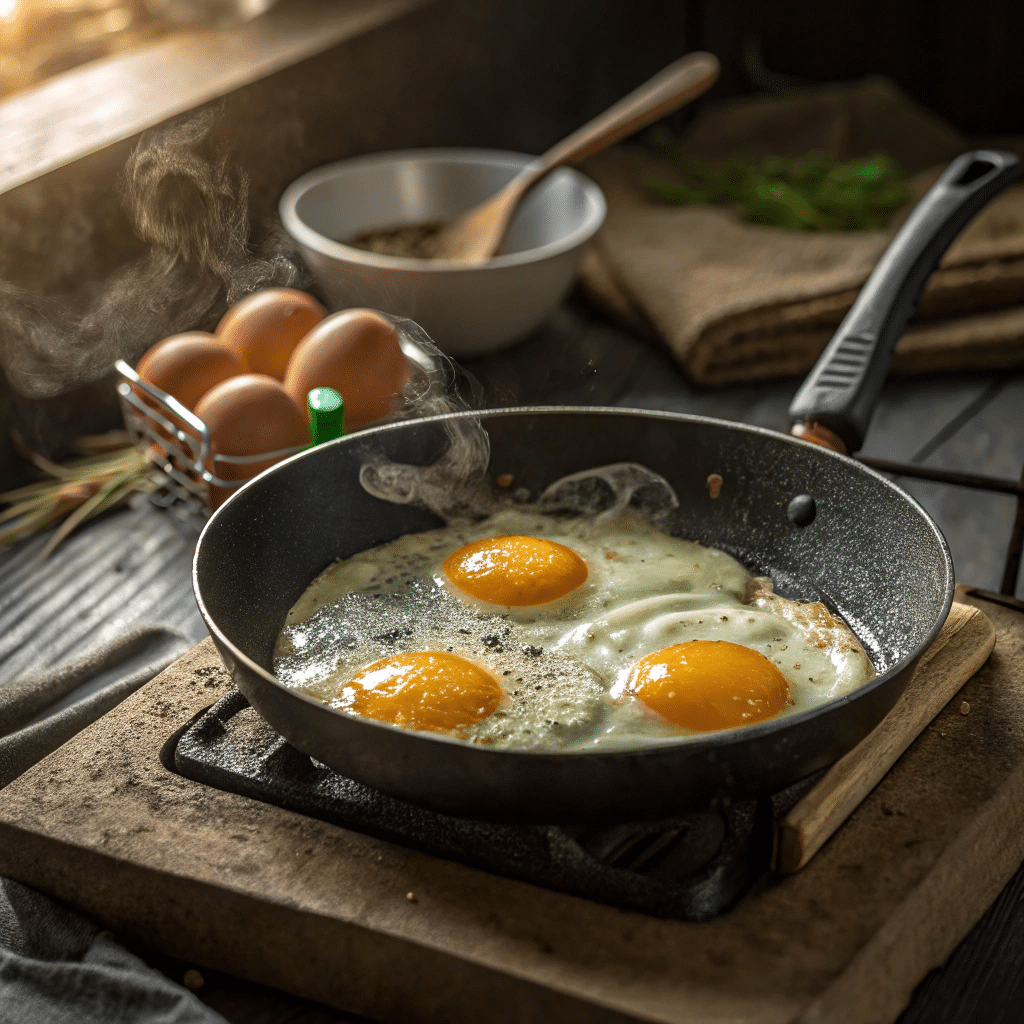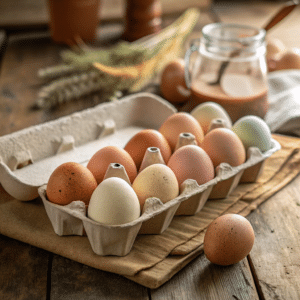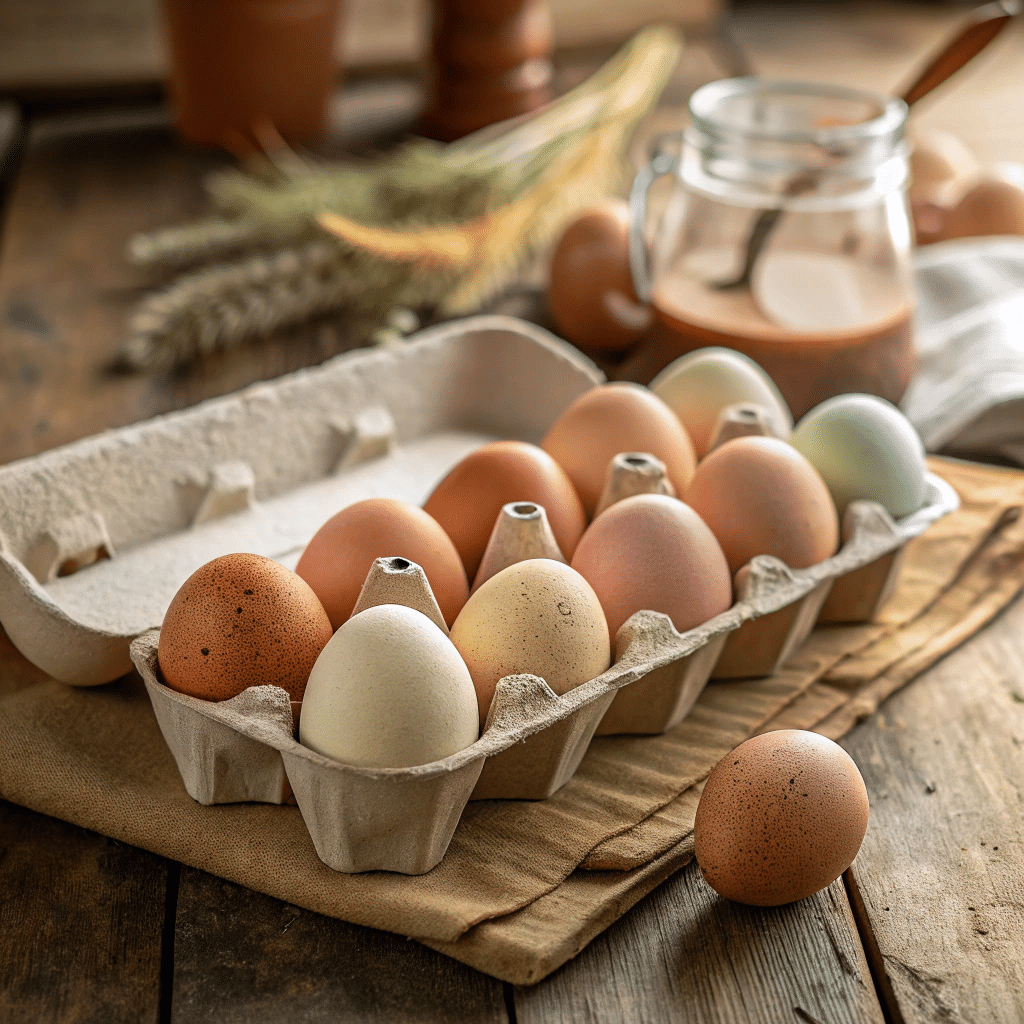Introduction
Pasture raised eggs are a game-changer in the kitchen—rich, flavorful, and packed with nutrients that truly make a difference.
Hello, fellow food lovers! I’m Maria, your chef and the creative force behind Snackly Recipes. This blog is all about sharing my passion for food, flavors, and easy-to-follow recipes designed for everyone—from seasoned home cooks to enthusiastic beginners. Whether you’re looking for a quick snack, a delightful treat for a gathering, or a nourishing meal after a busy day, Snackly Recipes is here to bring inspiration and joy to your kitchen.
Snackly Recipes started with a simple idea: make cooking fun, approachable, and full of flavor. I believe great food starts with great ingredients—and that’s how I first fell in love with pasture raised eggs. One weekend, I picked up a dozen from a local farm just out of curiosity. The moment I cracked one open and saw that vibrant orange yolk, I knew I was onto something special.
That little discovery transformed how I cook breakfast—and a lot more. These eggs aren’t just tasty; they’re healthier and more sustainable too. In this post, I’ll walk you through everything you need to know about pasture raised eggs so you can see why they’re worth it.
Print
Pasture Raised Eggs: The Definitive Guide for Health, Taste & Downsides
Description
A quick and nourishing way to enjoy pasture raised eggs—perfectly soft-boiled with a creamy yolk and rich flavor.
Ingredients
– 4 pasture raised eggs
– Water for boiling
– Pinch of salt (optional)
Instructions
1. Bring a small pot of water to a gentle boil.
2. Gently lower the eggs into the water using a spoon.
3. Boil for exactly 6 minutes for soft, jammy yolks.
4. Remove eggs and place in an ice bath for 1–2 minutes.
5. Gently peel and serve with salt, toast, or as part of a bowl.
Notes
Use eggs that are room temperature for more even cooking. Adjust time slightly for firmer or runnier yolks.
Nutrition
- Calories: 140
- Sodium: 70mg
- Fat: 10g
- Carbohydrates: 1g
- Protein: 12g
- Cholesterol: 210mg
Table of Contents
Are Pasture Raised Eggs the Healthiest Option?
Nutrient Boost You Can Taste
Among the many options at the grocery store, pasture raised eggs stand out for their exceptional nutrition and flavor. Hens raised on open pastures have access to sunlight and a varied, natural diet—which translates directly into the quality of their eggs.
Key Health Benefits
These eggs provide several standout nutrients:
- Omega-3 Fatty Acids: Essential for heart and brain function
- Vitamin D: Naturally boosted by sun exposure
- Lutein & Zeaxanthin: Powerful antioxidants that protect eye health
- Vitamins A & E: Support immune function, skin, and vision
Backed by Research
Studies consistently show that eggs from pasture-raised systems contain:
- Up to 3 times the omega-3s
- Twice the vitamin A
- 4 to 6 times more vitamin D
- Slightly lower cholesterol
Nutritional Comparison Table
| Nutrient | Conventional Eggs | Pasture Raised Eggs |
|---|---|---|
| Omega-3s | Low | High |
| Vitamin D | Moderate | Very High |
| Vitamin A | Less | More |
| Vitamin E | Lower | Higher |
| Cholesterol | Higher | Slightly Lower |
When it comes to clean eating and better nutrition, pasture raised eggs are a top-tier choice that supports both wellness and flavor.
What Are the Disadvantages of Pasture Raised Eggs?
While pasture raised eggs have clear benefits, they’re not without their drawbacks. Understanding these can help you make an informed decision that fits your values, budget, and lifestyle.
1. Higher Cost

One of the biggest downsides is the price tag. These eggs typically cost 2 to 3 times more than conventional eggs. That extra cost reflects:
- More land and labor required per hen
- Better feed and healthcare
- Ethical and sustainable farming practices
For many families, the premium price can add up quickly—especially if eggs are a staple in your household.
2. Limited Availability
Depending on where you live, pasture raised eggs might be harder to find. While they’re growing in popularity, they’re still not as common as cage-free or conventional eggs, particularly in smaller supermarkets or rural areas.
You might need to visit a specialty grocery store, health food shop, or farmers’ market—or order directly from a farm.
3. Inconsistent Labeling Standards
Unlike labels such as ‘organic,’ the phrase pasture raised has no official USDA definition or regulation. That means:
- Not all brands follow the same space or outdoor access guidelines
- Marketing claims may be misleading
- Without third-party certifications (like Certified Humane or Animal Welfare Approved), there’s little oversight
Always check the carton for certification logos and specific language about pasture size or outdoor access.
4. Weather and Environmental Risks
Raising hens outdoors brings exposure to:
- Predators
- Harsh weather (cold, rain, extreme heat)
- Parasites and disease from uncontrolled environments
If not managed well, these factors can affect the health of the hens—and the quality or safety of the eggs.
Should You Wash Pasture Raised Eggs?
If you’ve ever bought pasture raised eggs straight from a farm or farmers’ market, you might notice they sometimes arrive with a bit of dirt or feathers on the shell. This often raises a common question: should you wash them?
The Short Answer: Usually, No
Unlike store-bought eggs that are commercially washed, pasture raised eggs collected directly from the farm often retain their natural bloom—a thin, protective coating that seals the shell and helps keep bacteria out. Washing removes this layer, which can make the egg more susceptible to contamination.
Unless visibly dirty, unwashed eggs are best left as-is and stored properly.
When It’s Okay to Wash
If your eggs are covered in mud or droppings, it’s fine to give them a quick clean—right before use, not before storing. Here’s how:
- Use warm water, not cold (cold water can draw bacteria in)
- Skip the soap—just wipe gently with a clean cloth or soft brush
- Dry thoroughly before cracking
Storage Tips
- Unwashed eggs: Store at room temperature for up to 2 weeks, or refrigerate for longer shelf life
- Washed eggs: Always refrigerate and use within 1 week
Proper handling helps preserve freshness and food safety without compromising the benefits of your farm-fresh eggs.
Is Pasture Raised Egg Healthy?
Yes—pasture raised eggs are considered one of the healthiest animal-based protein sources available, thanks to both their superior nutrition and minimal processing. But let’s break down what that actually means for your health.
Protein-Rich and Nutrient-Dense
Each large egg delivers about 6 grams of high-quality protein, along with essential vitamins and minerals. When hens are raised on pasture, their eggs contain:
- More omega-3s for heart and brain support
- Higher vitamin D to aid bone health and immune function
- Boosted levels of vitamins A and E, which support skin, eyes, and cellular repair
That means pasture raised eggs not only give you energy—they contribute to your body’s overall resilience and recovery.
Great for Weight Management
Because they’re packed with protein and healthy fats, these eggs help keep you feeling full longer. That can:
- Reduce snacking between meals
- Help stabilize blood sugar
- Support healthy metabolism
They’re an ideal choice for breakfast or post-workout meals.
Are There Any Health Concerns?
For most people, no. While eggs do contain cholesterol, recent research suggests that dietary cholesterol has a minimal effect on blood cholesterol for the majority of people. In fact, moderate egg consumption—especially when the eggs are nutrient-rich—can be part of a heart-healthy diet.
If you’re sensitive to cholesterol or under a medical diet, consult your healthcare provider—but for most, pasture raised eggs offer more benefits than drawbacks.
How to Choose Truly Good Pasture Raised Eggs
Not all pasture raised eggs are created equal. Just because a carton says “pasture raised” doesn’t mean the hens had real outdoor freedom—or that the eggs are worth the price. Here’s how to tell you’re getting the good stuff.
Look Beyond the Label
The term “pasture raised” isn’t regulated by the USDA, so brands can use it loosely. That’s why it’s smart to look for third-party certifications, such as:
- Certified Humane – Pasture Raised
- Animal Welfare Approved
- Vital Farms seal
These certifications ensure that hens have at least 108 square feet of outdoor space, plus quality feed and humane treatment.
What to Check on the Carton
- Pasture size per hen (look for 100+ sq ft)
- Feed quality: “Organic,” “Non-GMO,” or “Vegetarian fed”
- Certifications: These are more reliable than vague marketing terms
Farmers’ Market and Local Sourcing
Buying directly from local farmers lets you ask questions about how the hens are raised and fed. This transparency can help you find truly high-quality pasture raised eggs—often fresher and more affordable than store-bought options.
Visual and Taste Cues
Once you crack them open, quality shows:
- Yolks are deep orange, not pale yellow
- Shells are strong and clean
- Flavor is noticeably richer, especially when scrambled or soft-boiled
A little label reading goes a long way in making sure you’re getting the most nutritious and ethically produced eggs available.
Cooking & Storing Pasture Raised Eggs
Once you’ve stocked up on pasture raised eggs, it’s important to store and cook them properly to get the best flavor and nutritional benefits. These aren’t your average supermarket eggs—and they deserve a little extra care.
How to Store Them
- Unwashed eggs (common at farmers’ markets): Store at room temperature for up to 2 weeks or refrigerate for longer freshness.
- Washed eggs (typically from grocery stores): Always refrigerate and use within 3–5 weeks.
- Keep eggs in the original carton to reduce moisture loss and protect them from absorbing fridge odors.
If you’re unsure whether your pasture raised eggs are still fresh, try the float test: place an egg in water. If it sinks and lays flat, it’s fresh. If it floats, it’s time to toss it.

Best Cooking Methods
Thanks to their richer yolks and firmer whites, these eggs shine in simple preparations:
- Soft-boiled or poached: Preserves nutrients and lets that golden yolk shine.
- Scrambled in butter or ghee: Creamy, decadent, and protein-packed.
- Fried over medium: Delicious on toast or grain bowls.
Avoid overcooking—pasture raised eggs cook a bit faster and can dry out more quickly than conventional ones.
Bonus Tip: Save the Shells
Crushed eggshells are rich in calcium and can be added to compost or used in garden beds to enrich the soil. Waste nothing!
Environmental & Ethical Considerations
One of the biggest reasons people choose pasture raised eggs—besides nutrition and taste—is their alignment with sustainable and humane food practices. But what exactly makes these eggs more eco-conscious and ethical?
Better for the Hens
In industrial egg production, hens are often kept in small cages or crowded barns with no access to the outdoors. In contrast, hens that lay pasture raised eggs live in open pastures where they can forage, dust-bathe, and roam freely. This natural lifestyle reduces stress, improves their health, and results in better-quality eggs.
Environmental Benefits
Well-managed pasture systems can support the environment by:
- Enhancing soil fertility through natural manure
- Promoting biodiversity—hens eat weeds and pests without chemicals
- Reducing the need for synthetic fertilizers and antibiotics
That said, pasture farming uses more space per bird, which could increase land use—but this is often balanced by more sustainable farming practices.
Making Ethical Food Choices
By choosing pasture raised eggs, you’re supporting:
- Humane animal treatment
- Transparent farming methods
- Small and mid-size farms focused on regenerative agriculture
For many, the choice reflects a desire to eat in a way that’s kinder to animals, healthier for the land, and better for future generations.
Cost vs Value – Are Pasture Raised Eggs Worth It?
Let’s face it—pasture raised eggs aren’t cheap. You’ve probably noticed they cost double or even triple the price of conventional eggs. So, are they really worth the extra dollars?
Why They Cost More
The higher price reflects better practices all around:
- More land per hen: At least 100 square feet each
- Healthier feed and care
- Higher labor costs: Small farms often hand-collect eggs and manage smaller flocks
- Humane, ethical treatment of animals
You’re not just paying for the egg—you’re paying for the entire farming philosophy behind it.
Nutritional Return on Investment
When you break it down by nutrients, pasture raised eggs deliver more value:
- Higher levels of omega-3s, vitamins A, D, and E
- More antioxidants and quality fats
- Better taste and texture
Think of it like this: you’re getting more nutrition per egg, which could reduce your need for other supplements or costly processed foods.
Budget-Friendly Tips
Want to enjoy these eggs without overspending?
- Buy in bulk at farmers’ markets or local co-ops
- Look for sales or subscribe to farm delivery programs
- Mix and match: Use pasture eggs for eating plain (scrambled, poached), and conventional ones for baking
For many, choosing pasture raised eggs is about long-term value—supporting animal welfare, eating nutrient-rich foods, and investing in sustainable food systems.
Conclusion: Are Pasture Raised Eggs Right for You?
When it comes to nutrition, taste, and ethics, pasture raised eggs stand in a category of their own. They offer a deeper orange yolk, a richer flavor, and a significantly better nutrient profile compared to conventional options. But what really sets them apart is how they’re produced—by hens that live more natural, humane lives on open pastures.
Yes, they cost more. But with that price comes greater value: healthier food for your family, a vote for more responsible farming practices, and support for local and sustainable food systems.
Whether you’re a serious home cook or just someone trying to eat a bit better, adding pasture raised eggs to your routine is a simple, delicious way to upgrade your meals—and your values.
For many, the benefits outweigh the cost. It’s not just about what’s inside the shell—it’s about where it came from and how it was made.
FAQs About Pasture Raised Eggs
Is pasture-raised the healthiest egg?
Yes, pasture raised eggs are often considered the healthiest option. They come from hens that forage naturally outdoors, leading to eggs with more omega-3 fatty acids, vitamin D, and antioxidants compared to conventional or cage-free eggs. Their richer nutritional profile and ethical sourcing make them a top choice for health-conscious eaters.
What are the disadvantages of pasture-raised eggs?
The biggest disadvantages are higher cost, inconsistent labeling, and limited availability in some areas. Since the term isn’t strictly regulated, some products may not meet true pasture standards unless third-party certified. Also, these eggs may not be as accessible in every grocery store or region.
Should you wash pasture-raised eggs?
It depends on how they were handled. If the eggs are unwashed and fresh from a farm, it’s best not to wash them before storing, as the natural bloom protects against bacteria. Only wash them right before using if they’re visibly dirty. Commercially sold pasture raised eggs are usually already washed and should be refrigerated.
Is pasture-raised egg healthy?
Absolutely. A pasture-raised egg contains more essential nutrients, including higher-quality fats, antioxidants, and fat-soluble vitamins. Their health benefits go beyond the nutrition label, offering a cleaner, more natural food source with fewer artificial inputs or additives.
Do you like Kennedy Fried Chicken
For more recipe follow me in Facebook
Pasture Raised Eggs: Top 10 Health Benefits & Ethical Choices

Pasture raised eggs offer superior nutrition, richer flavor, and humane farming practices. Discover their health benefits, cooking tips, and ethical impact in this complete guide.
Cuisine: American
Preparation Time: PT2M
Cooking Time: PT6M
Total Time: PT8M
Recipe Ingredients:
- 4 pasture raised eggs Water for boiling Pinch of salt (optional)
Recipe Instructions: Bring water to a gentle boil in a small saucepan. Gently lower the eggs into the water using a spoon. Boil for exactly 6 minutes for a jammy yolk. Transfer eggs to an ice bath for 1–2 minutes. Peel and serve with salt or on toast. Nutrition (per serving): Calories: 140 Protein: 12g Fat: 10g Carbs: 1g

